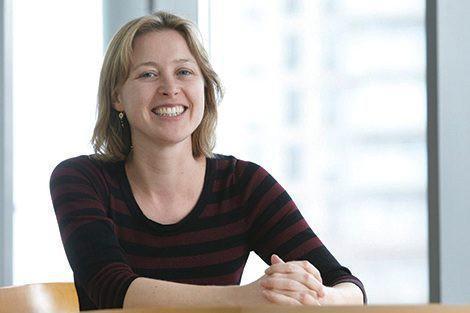[ Spring 2014 ]
Rebecca Hope, MPH ’14, told a gathering earlier this year how she imagines the future of public health unfolding. Her remarks, excerpted here, come from Harvard School of Public Health’s installation of a time capsule in the lobby wall of the FXB building as part of the School’s Centennial. The time capsule will be opened in 2063. Learn more at hsph.me/timecapsule.
“When I think about the last 50 years in health, I think of my grandfather. He contracted polio as a child and spent almost a year in Liverpool [England] City Hospital. Despite being told he would never walk again, he went on to run marathons. It seems unbelievable that a disease now on the verge of being eradicated was a real fear for so many families.
As Dean Frenk reminds us, the average life expectancy during the 20th century increased by 30 years in the U.S., with 25 years of that increase due to improvements in public health. Thanks to work over the last 50 years by incredible scientific minds—many working here under this roof—there are far fewer diseases for which we lack the right treatments and prevention strategies. Today, our real and pressing challenge is to find ways to improve access to these treasures. To gain the kinds of improvements in human health experienced during the last 50 years, we will have to focus more on the creative, effective, caring implementation of what we already know.
There is one remarkable asset needed to achieve this: people. What will save the most lives in the next 50 years is the daily service of people—people like you, imaginatively deployed to prevent human suffering. Volunteer health workers who travel across muddy roads to deliver health care to their communities. Nurses and doctors effectively delivering the right level of care, not the type of care that pays them the most money. The volunteer on the end of the phone, talking to someone who feels desperate. It will be human kindness, brilliantly channeled, that will continue to improve the health of millions over the next 50 years.
What is most impressive about the class of 2014 at HSPH is their motivation and aptitude to lead through their service. Students here are serving women in rural Kenya who need better access to medical care. They are using technology to train doctors in Palestine across geographical and political borders. They are coordinating health care for refugee populations from Syria. There are dengue scientists, health systems analysts, statisticians, future ministers of health, gender experts, economists, surgeons and pediatricians, innovators in technology and mHealth, dedicated health workers and humanitarians.
Like the world, HSPH will be different in 2063. But what won’t change is the essential character of the students, faculty, and staff at HSPH. This will continue to be a place of brilliance—where smart, diverse, and engaged students and faculty can build friendships into partnerships, turn ideas into solutions, and put passion into practice. The passion, intelligence, and dedication collected in this room today make me believe that this is a very achievable goal.”
Rebecca Hope is a British-trained pediatrician with research experience in HIV epidemiology in adolescents, maternal and child health, and microfinance in resource-poor settings.
Photo: Kent Dayton / HSPH
Download a PDF of Quote/Unquote with Rebecca Hope
